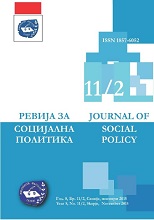Qualitative analysis of the newly impoverished families in the Republic of Macedonia
Qualitative analysis of the newly impoverished families in the Republic of Macedonia
Author(s): Vesna DimitrievskaSubject(s): Methodology and research technology, Social development, Family and social welfare, Economic development
Published by: Филозофскиот факултет во Скопје
Keywords: Poverty; qualitative measurements; newly impoverished families;
Summary/Abstract: The poverty measurement and observation by the double method and using the information on the basic structures of state benefits users have enabled identification of three basic groups of poor families: traditionally poor, newly impoverished families and chronically poor families. The aim of this work is to examine, describe and explain the newly impoverished families, using the data obtained from the qualitative measurements. Newly impoverished families are those that have felt the dynamic decline of the living standard during the transition period (households without a single employed member, households with employed members who do not get salaries on time, households having more members). Various data sources have been used in the analysis: natural environment observation, an interview (individual and group), and various types of written documents. Without any additional interventions of the researcher, information given by the media were used, conversations of citizens and politicians were carefully listened to for this problem. The generalizations made for the researched problem, the newly impoverished families, arise mostly from the research elaborated with detailed information for 20 families (newly impoverished) followed through a 10-year period .
Journal: Ревија за социјална политика
- Issue Year: 2015
- Issue No: 11/2
- Page Range: 185-206
- Page Count: 22
- Language: English

